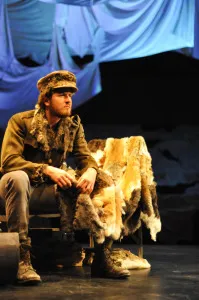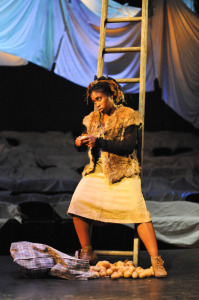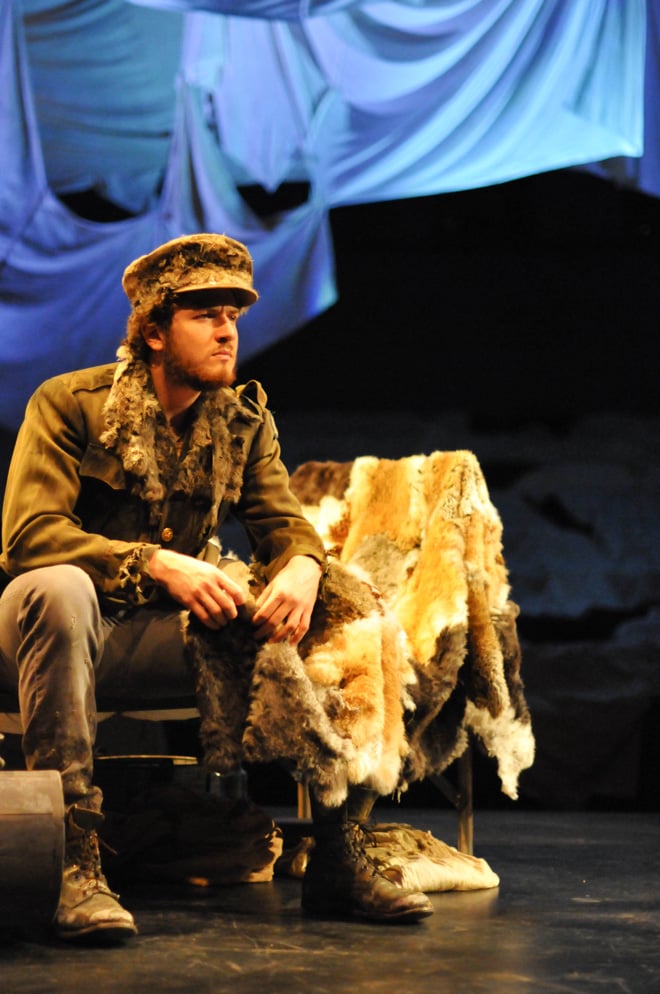
“To be is to dishevel and die.” This is one of the few phrases the “idiot boy,” Reo, utters in “A Kingdom, A Country or a Wasteland, In the Snow,” yet it tells us a great deal about ourselves. As the show progressed, I saw that it was in fact I who was the idiot, not Reo. Kellen Hoxworth elicits this reaction marvelously, turning his viewers back in on themselves to reevaluate the assumptions they have made about their essence.
When Reo (Levi Jennings) appears on the scene, he’s unable to speak or recollect anything, having been discovered in a mound of snow by sisters Luba (Ellen Woods ’18) and Lisa (Justine Beed ’17). The two live with their father (Victor Spielberg Verdejo) and mother (Kasiemobi Udo-Okoye). Their relations already estranged by the harsh milieu of winter, and tensions erupt around Reo’s arrival, as Luba and Lisa compete for his affection. Father is threatened by Reo because of the more-than-paternal relations he maintains with Lisa; meanwhile Mother slowly begins to lose her grip with sanity.
The unorthodox set design, by Angrette McCkloskey and Erik Flatmo, accentuates the funereal atmosphere. Instead of having the audience sit in the general seating of Pigott Theater, the audience actually sits on stage — white sheets occupy the space where seating normally is. Having the audience in such close proximity to the actors helped ensure its investment in the action. Moreover, the huge yet sparse backdrop has a desolate quality that augments the drama noticeably.
On-stage, Jennings excels, crawling about with an uncomprehending manner, befitting an unsocialized brute. Beed similarly enraptures us with a tragic portrayal of Lisa. From her subdued expressions of envy at Luba’s intimate relationship with Reo to her powerful indignation towards her father’s advances, Beed carries us from torment to torment, never breaking character.

Verdejo plays Father, the primary actuator of conflict, whose wolf-like disposition is deeply disturbing. He has all the characteristics of a hound—predatory, ready to pounce—mixed with the bitter regret of a wounded man who longs for reconciliation with his alienated wife. I dare say we even felt an iota of empathy for the man, at times.
Last, but certainly not least, Ellen Woods dazzles with her chilling performance of Luba. Snarling like a cornered beast, she reinforces the primal tenor of the play, while still maintaining Luba’s humanity. Perhaps one of the most emotionally moving scenes is one in which Woods rejects a mirror shoved at her by Reo, bemoaning her ugliness. Yet, Woods is clearly not an unattractive woman. She radiates a strong femininity, which only intensifies her character’s unfounded insecurities. Woods demonstrates that insecurity is a necessary condition of humanity, even in the dead of winter.
Ultimately, Hoxworth’s interpretation of Lola Aria’s heart-wrenching drama expertly forces us to confront our own humanity. It makes us reevaluate whether we would conduct ourselves any differently from these characters if we were placed in this wasteland in the snow.
Contact Ian Anstee at ianstee5 ‘at’ stanford.edu.
